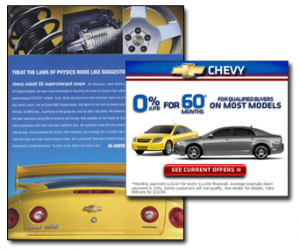

When an advertiser buys ads from both print and online versions of a brand, the extra frequency targeted to the most active and valuable part of the audience is maximized.
Strategies that maximize the repetition an advertiser can achieve are vitally important to advertiser success. That’s the message that Daniel M. Ambrose, author of the Internet Sales Guidebook and special guest speaker at this year’s Mequoda Summit in Napa Valley, will be sharing with Summit attendees in just a few short weeks.
Ambrose believes that while many of the largest and most sophisticated advertising clients say they want “integrated” media plans, they are not properly set up to plan them.
Many clients have separate print and web advertising agencies. Others have one agency or agency holding company planning their advertising but the separate departments don’t know what each other are doing.
When a print sales person calls on a print media planner and asks about interest in web advertising, they may well be told there is no budget for it. Meanwhile, an online planner may be planning a campaign.
This should not deter publishers. It simply reminds sales people and management to do what they need to do: call on the executives at the top.
[text_ad]
There are four key practices and strategies Ambrose suggests that will make publishers successful in selling hybrid print and web advertising packages:
1. First, staff your business for Hybrid Media by building a hybrid sales team: two sales groups, one print and one online, working separately and when appropriate, together. Compensate them to cooperate rather than compete. Print publishers will find that they must hire additional sales staff to succeed with online because – in part – there are new non-print-spending clients, lots of them that the print staff may not reasonably be expected to call upon.
2. Make calls as high at the agency and client as possible. Make a concerted effort to call on the executive at the level to which both print and online planning report. Being in a position to design and propose a multimedia solution for an advertiser is an advantage to get the high-level appointments you need to rise above the competition.
3. In the sales process, the most successful sales people follow a problem-solution sales approach. When selling hybrid packages, define two related marketing problems to sell the combined solution.
4. Since print advertising is typically planned relatively far in advance to meet 90-day print closing dates, prospect every print client for an online opportunity, possibly planned afterwards to coincide with the print. And prospect every online client for an up-sell. Once they have found that your online audience works for them they may consider adding print to extend their success.
And finally, when designing proposals, create cross-media proposals where one medium directly supports the other.
For instance, if an online client is interested in sponsoring your new social media application, or a webinar, make the proposal a combination of the sponsorship itself, as well as co-branded print ads that promote the Web application and the advertisers’ sponsorship of it.
So, how are you handling the selling of Hybrid Media at your organization? Do you agree that Hybrid Media is more powerful than traditional media?